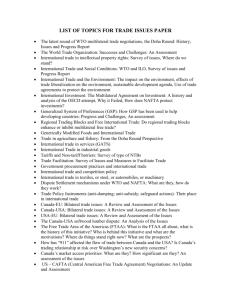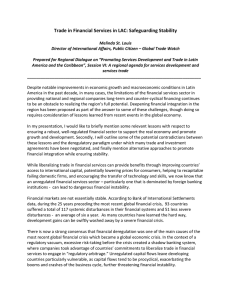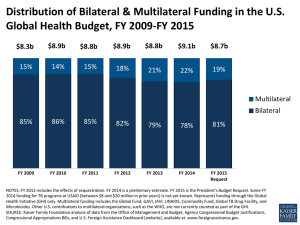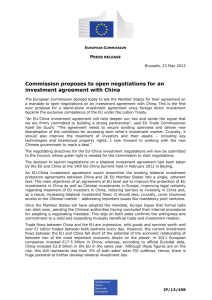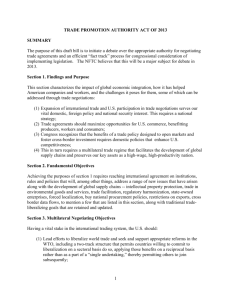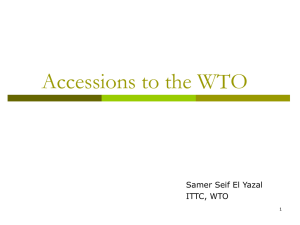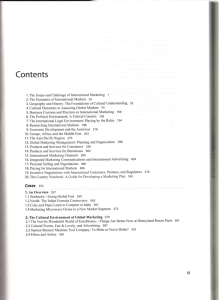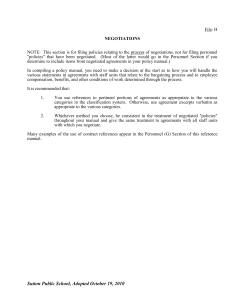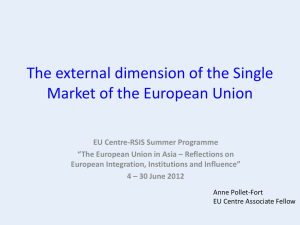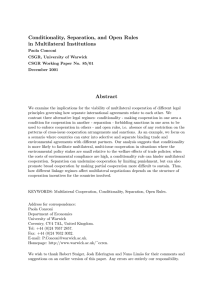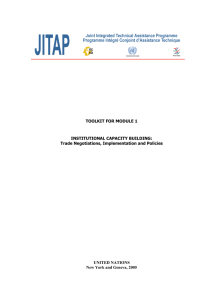Common Trade Policy
advertisement
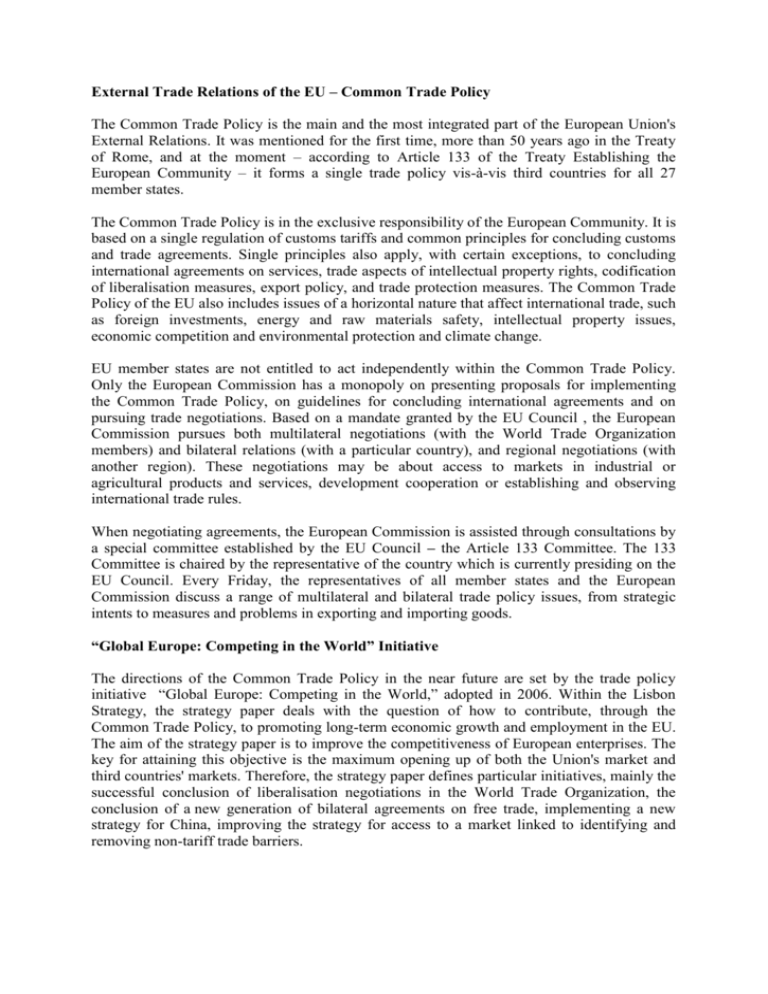
External Trade Relations of the EU – Common Trade Policy The Common Trade Policy is the main and the most integrated part of the European Union's External Relations. It was mentioned for the first time, more than 50 years ago in the Treaty of Rome, and at the moment – according to Article 133 of the Treaty Establishing the European Community – it forms a single trade policy vis-à-vis third countries for all 27 member states. The Common Trade Policy is in the exclusive responsibility of the European Community. It is based on a single regulation of customs tariffs and common principles for concluding customs and trade agreements. Single principles also apply, with certain exceptions, to concluding international agreements on services, trade aspects of intellectual property rights, codification of liberalisation measures, export policy, and trade protection measures. The Common Trade Policy of the EU also includes issues of a horizontal nature that affect international trade, such as foreign investments, energy and raw materials safety, intellectual property issues, economic competition and environmental protection and climate change. EU member states are not entitled to act independently within the Common Trade Policy. Only the European Commission has a monopoly on presenting proposals for implementing the Common Trade Policy, on guidelines for concluding international agreements and on pursuing trade negotiations. Based on a mandate granted by the EU Council , the European Commission pursues both multilateral negotiations (with the World Trade Organization members) and bilateral relations (with a particular country), and regional negotiations (with another region). These negotiations may be about access to markets in industrial or agricultural products and services, development cooperation or establishing and observing international trade rules. When negotiating agreements, the European Commission is assisted through consultations by a special committee established by the EU Council – the Article 133 Committee. The 133 Committee is chaired by the representative of the country which is currently presiding on the EU Council. Every Friday, the representatives of all member states and the European Commission discuss a range of multilateral and bilateral trade policy issues, from strategic intents to measures and problems in exporting and importing goods. “Global Europe: Competing in the World” Initiative The directions of the Common Trade Policy in the near future are set by the trade policy initiative “Global Europe: Competing in the World,” adopted in 2006. Within the Lisbon Strategy, the strategy paper deals with the question of how to contribute, through the Common Trade Policy, to promoting long-term economic growth and employment in the EU. The aim of the strategy paper is to improve the competitiveness of European enterprises. The key for attaining this objective is the maximum opening up of both the Union's market and third countries' markets. Therefore, the strategy paper defines particular initiatives, mainly the successful conclusion of liberalisation negotiations in the World Trade Organization, the conclusion of a new generation of bilateral agreements on free trade, implementing a new strategy for China, improving the strategy for access to a market linked to identifying and removing non-tariff trade barriers. Other particular actions, by which the EU intends to enhance competitiveness, include strengthening the protection and enforcement of intellectual property rights, facilitating access of the Union's bidders to public procurement, and reflecting trade protection instruments. Multilateral Trade System – the World Trade Organization (WTO) All member states of the European Community are members of the World Trade Organization (WTO). At the same time, the European Community is also a member of WTO, represented by the European Commission. The European Community supports an open and strong multilateral trade system represented by the WTO, and intends to press for strengthening of WTO' s role, for enlarging and improving its system, and for the wider and much more active participation of all its members. The European Community, together with WTO members with similar opinions, is endeavouring to successfully conclude a further round of multilateral trade negotiations – the ‘Doha Development Programme’ (DDA). This includes a number of negotiation areas and should link the issues of improving access to markets (trade liberalisation) with making multilateral trade rules more precise or negotiating new ones. The most significant areas of DDA include agricultural reform, liberalisation of trade in non-agricultural products and services, some elements of the Agreement on Trade-related Aspects of Intellectual Property Rights, trade and environment areas and facilitating trade. All agendas include the “development aspect” - giving greater advantages to developing and least developed countries to accelerate their deeper participation in the world trade system. Negotiations were commenced in 2001 and although they should have been concluded in 2005, they are still under way. EU Bilateral Trade Relations In addition to promoting the multilateral trade system, the EU is involved in developing trade relations with individual states or groups of states. The bilateral dimension of the EU' s trade relations is characterised by a large number of preferential agreements and arrangements, inter-regional initiatives, and other agreements. The group of the most important preferential partners includes the European Free Trade Association (EFTA), the Mediterranean and Balkan states, Turkey, Mexico, Chile, and South Africa. At the moment, the EU intends to conclude negotiations started several years ago, on agreements with the African, Caribbean, and Pacific (ACP) group regions, with countries of the Persian Gulf and with MERCOSUR. In 2007, in compliance with the new strategy, negotiations were commenced with South Korea, India, the ASEAN states, countries of Central America, the Andean Community, and the Ukraine. The EU helps developing countries to access its market by providing unilateral advantages, either according to the General System of Preferences or specific regulations for the countries of Western Balkan, Moldova, and overseas territories. Common Trade Policy Priorities of the Czech Presidency In the long term, the EU promotes the maximum liberalisation of world trade. It ensures the favourable access of the Union's goods into the third countries' markets by all available instruments and opens up its market for foreign goods, while consistently observing international trade rules, and if they are infringed it takes steps to protect the Union's interests. A liberal trade policy is one of the main priorities of the Czech Presidency. The Czech Presidency supports a Europe open to trade and investments and strives for third countries' to reduce their markets' protection reciprocally and for the creation of fair conditions for mutual trade. Therefore, the Czech Presidency will focus on completing or pursuing all the particular initiatives of the adopted strategy paper “Global Europe: Competing in the World”. The Czech Presidency considers the WTO' s multilateral trade system to be the most efficient way of governing world trade, so, depending on the development negotiations, it will endeavour to reach an agreement within the Doha Development Programme or commence new negotiations. Within the bilateral relations, depending on the status of the current negotiations, the Czech Presidency will support the conclusion of free trade agreements with selected countries. Attention will also be paid to removing non-tariff trade burdens, using the Union's new strategy of access to the market based on a partnership of the European Commission, member states and the entrepreneurial sphere. Priorities will also include concluding the debate on revising trade protection measures, which will lead to further trade liberalisation and respecting the Union's economic interests. Last but not least, all means will be used to improve the protection and enforcement of intellectual property rights of Union entities both on third markets and inside the EU, including by concluding bilateral agreements.
